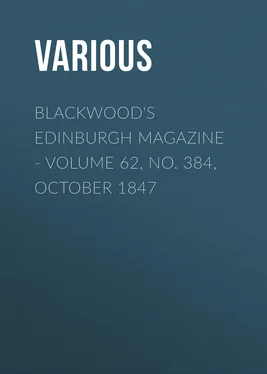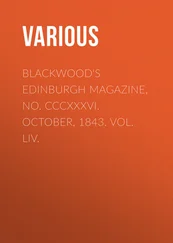Various - Blackwood's Edinburgh Magazine - Volume 62, No. 384, October 1847
Здесь есть возможность читать онлайн «Various - Blackwood's Edinburgh Magazine - Volume 62, No. 384, October 1847» — ознакомительный отрывок электронной книги совершенно бесплатно, а после прочтения отрывка купить полную версию. В некоторых случаях можно слушать аудио, скачать через торрент в формате fb2 и присутствует краткое содержание. Издательство: Иностранный паблик, Жанр: foreign_antique, periodic, foreign_edu, на английском языке. Описание произведения, (предисловие) а так же отзывы посетителей доступны на портале библиотеки ЛибКат.
- Название:Blackwood's Edinburgh Magazine - Volume 62, No. 384, October 1847
- Автор:
- Издательство:Иностранный паблик
- Жанр:
- Год:неизвестен
- ISBN:нет данных
- Рейтинг книги:5 / 5. Голосов: 1
-
Избранное:Добавить в избранное
- Отзывы:
-
Ваша оценка:
- 100
- 1
- 2
- 3
- 4
- 5
Blackwood's Edinburgh Magazine - Volume 62, No. 384, October 1847: краткое содержание, описание и аннотация
Предлагаем к чтению аннотацию, описание, краткое содержание или предисловие (зависит от того, что написал сам автор книги «Blackwood's Edinburgh Magazine - Volume 62, No. 384, October 1847»). Если вы не нашли необходимую информацию о книге — напишите в комментариях, мы постараемся отыскать её.
Blackwood's Edinburgh Magazine - Volume 62, No. 384, October 1847 — читать онлайн ознакомительный отрывок
Ниже представлен текст книги, разбитый по страницам. Система сохранения места последней прочитанной страницы, позволяет с удобством читать онлайн бесплатно книгу «Blackwood's Edinburgh Magazine - Volume 62, No. 384, October 1847», без необходимости каждый раз заново искать на чём Вы остановились. Поставьте закладку, и сможете в любой момент перейти на страницу, на которой закончили чтение.
Интервал:
Закладка:
Obedient to a gesture of Tiberius, the Bacchante was placed upon a pedestal. For a moment, she stood before them an exquisite statue Of despair—exquisite even in the excess of her bewilderment. For a moment, she stood there stunned by the suddenness of the commotion, and frantic with the consciousness of her peril. For a moment she gazed about her for aid, wildly but, alas! vainly. No pity beamed upon her in that more horrible Gomorrah. The marble trembled under her feet—a sulphurous stench shot through its crevices—the virgin shrieked and fell forwards, scorched and blackened to a cinder. She was blasted, as if by a thunderbolt. 11 11 Those who are familiar with the classic historians, will see in this description no exaggeration whatever. Instruments for the destruction of life yet more awful and mysterious, were employed by many of the predecessors, and many of the successors of Tiberius, as well as by Tiberius himself: and modern science has shown that these devices, instead of being, as was originally conjectured, the result of black-magic, were, in reality, the effect of hydraulic, pneumatic, and mechanical contrivances. Even the most marvellous feats of the Egyptian sorcerers have been latterly explained by the revelations of natural philosophy, and a multitude of these explanations may be found by the reader in the learned work "Des Sciences Occultes," &c. written by M. Eusebe Salverte, and published in Paris as recently as 1843. In that remarkable volume, M. Salverte proves that natural phenomena are more startling than necromantic tricks, and that, in the words of Roger Bacon, " non igitur oportet nos magicis illusionibus uti, cum potestas philosophica doceat operari quod sufficit. " That Tiberius was capable of atrocities yet more terrific, and that murders of the most inhuman kind were the consequence of almost every one of his diabolical whims, those acquainted with the picturesque narrative of Suetonius already know. They will remember not only how he caused his nephew Germanicus to be poisoned by the governor of Syria, but how he ordered a fisherman to be torn in pieces by the claws of a crab, simply because he met him, in one of his suspicious moods, when strolling in a sequestered garden of Capreæ.— Sue. Tib. c. lx.
Cagliostro looked with horror upon the ashes of the Bacchante. He had seen youth stricken down by age; he had seen virtue annihilated, so to speak, at the mandate of vice; he had seen—and even his callous heart exulted at the thought—he had seen innocence snatched from pollution, when upon the very threshold of an earthly hell. While rejoicing in this reflection, he was aroused by the stertorous breathing of the emperor. The crowned demon of the island was being borne away to his palace upon the shoulders of his attendants. Although maddened by an insatiable thirst, and by a gloom that was becoming habitual, the monster lay upon his cushions as impotent as a child, in the midst of his diseases and iniquities. 12 12 Suetonius assures us (cap. lxviii.), that the muscular strength of Tiberius Claudius Nero was, in the prime of his manhood, almost as supernatural as his crimes; that he could with his outstretched finger bore a hole through a sound apple ( integrum malum digito terebraret ), and wound the head of a child or even a youth with a fillip, ( caput pueri, vel etiam adolescentis, talitro vulneraret. ) His excesses must, however, have enervated his frame long before his death by suffocation.
At the feet of the Rosicrucian were huddled the bones of the virgin of Apulia; and the babbling of the fountains was alone audible in the solitude.
"Such," said the mournful Voice, as Cagliostro again felt himself carried through the darkness—"such, Balsamo, are the miseries of a debauched appetite."
AGRIPPA
In another instant, the impostor was standing upon the floor of a gigantic amphitheatre in Palestine. The whole air was refulgent with the light of a summer morning, and through the loopholes of the structure, the eye caught the blue shimmer of the Mediterranean. Banners, emblazoned with the ciphers of Rome, fluttered from the walls of the amphitheatre. Its internal circumference was thronged with a vast concourse of citizens; and, immediately about the Rosicrucian, groups of foreign traders, habited as if for some unusual ceremony, were scattered over the arena. Expectation was evinced in every movement of the assemblage, in every murmur that floated round the benches. The worshippers were there, it seemed, and were awaiting the high-priest. That high-priest was approaching, and more than a high-priest; for Herod Agrippa, the tetrarch of Judea had descended from Jerusalem to Cæsarea, for the celebration of warlike games in honour of the Emperor Claudius, and, on the completion of those festivities, the deputed sovereign had consented, at the intercession of Blastus, to receive a deputation of certain Phenician ambassadors who were solicitous for an assurance of his clemency. Those envoys—the merchant princes of Tyre and Sidon—were tarrying in the public theatre of the city for the promised interview in the presence of the people of Samaria.
Cagliostro marvelled, as he scanned the scene before him, whether it were all a reality or a delusion of his fancy; but the lapping of the surge upon the adjacent beach, and the perfume of Oriental spices which impregnated the breezes from the Levant, and even the motes that swarmed about him like phosphoric atoms, proved that it was no juggle of a distempered imagination.
Suddenly the air was rent with acclamations; the crowd rose as if by a single impulse; trumpets sounded in the seven porches of the amphitheatre; again the plaudits shook the air like the concussion of enthusiasm, and the deputation in the arena prostrated themselves in the dust. Balsamo saw, at once, the reason of this rejoicing; he saw the tetrarch of Judea seated upon a throne of ivory. The crown of Agrippa glittered upon his forehead with an unnatural brightness—it was of the purest gold, radiating from the brow in spikes, and flecked with pearls of an uncommon size. Silent—erect—inflated with pride at his own grandeur, and the adulation of the rabble, sate the King of Palestine. Silent—awe-stricken—uncovered before the majesty of the representative of Claudius, stood the people of Samaria and Phenicia. Extreme beauty of an elevated and heroic character shone upon the features of Herod, although his beard was grizzled with the passage of fifty-four winters. In the midst of the silence of the populace, the morning sun rose, almost abruptly, above the topmost arches of the edifice, and darted his beams full upon the glorious garments of Agrippa. It played in sparkles of intense lustre upon the jewels of his diadem; and upon the outer robe, which was of silver tissue woven with consummate skill and powdered with diamonds, the refraction of the sunlight produced an intolerable splendour. 13 13 His garb, writes Josephus, "was so resplendent as to spread a horror over those that looked intently upon Him."— Lib. xix. c. 8.
The Samaritans shielded their eyes from its magnificence; they were dazzled; they were blinded; they thrilled with admiration and astonishment.
Agrippa spoke.
At the first sound of his accents, there was a whisper of awe among the multitude—it increased—it grew louder—it arose to the heavens in one prolonged and jubilant shout of adoration.
"It is a God!" they cried—"it is a God that speaketh, not a man!"
As the language of that impious homage saluted the ears of Herod, his mouth curled with a smile of satisfaction, his soul expanded with an inexpressible tumult of emotions, he drank in the blasphemous flatteries of the rabble, and assumed to himself the power and the dignity of the Most High God. Yet in the very ecstasy of those sensations, his countenance became ghastly, his lips writhed, his eyes beheld with unutterable dismay the omen of his dissolution—the visible phantom of an avenging Nemesis. 14 14 "An owl," says Josephus (xix. 8); "an angel of the Lord," αγγελος Κυριου, say the scriptures, (Acts. xii. 23,)—in either case a spectral illusion.
He staggered from his throne, crying aloud in the extremity of his anguish; a sudden corruption had seized upon his body—he was being devoured by worms.
Интервал:
Закладка:
Похожие книги на «Blackwood's Edinburgh Magazine - Volume 62, No. 384, October 1847»
Представляем Вашему вниманию похожие книги на «Blackwood's Edinburgh Magazine - Volume 62, No. 384, October 1847» списком для выбора. Мы отобрали схожую по названию и смыслу литературу в надежде предоставить читателям больше вариантов отыскать новые, интересные, ещё непрочитанные произведения.
Обсуждение, отзывы о книге «Blackwood's Edinburgh Magazine - Volume 62, No. 384, October 1847» и просто собственные мнения читателей. Оставьте ваши комментарии, напишите, что Вы думаете о произведении, его смысле или главных героях. Укажите что конкретно понравилось, а что нет, и почему Вы так считаете.












